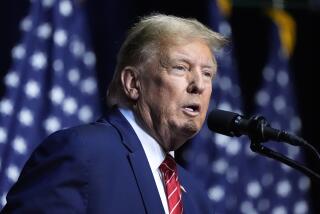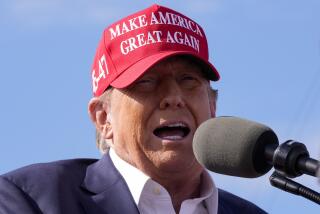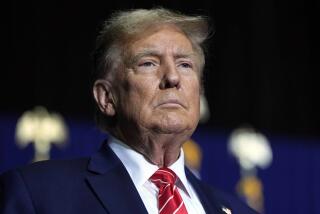Many top Republican donors on the sidelines in presidential primary race
Michael Ashner was one of Sen. John McCain’s major fundraisers in the 2008 presidential campaign, bringing in $500,000 for the Republican nominee.
That makes the Oyster Bay, N.Y., real estate investment executive one of the most sought-after bundlers for prospective GOP candidates in 2012. Supporters of former Massachusetts Gov. Mitt Romney have been particularly persistent in wooing him — New York Jets owner Woody Johnson even invited him to take in a game in his private box.
But Ashner is reluctant to sign up with any of the White House hopefuls.
“I’m sort of hiding under my desk when the calls come in,” said Ashner, noting he still wanted to learn more about the contenders. “I don’t see a dynamic candidate out there yet. A number of them have interesting credentials, but they just strike me as a little lackluster.”
Ashner is part of a large swath of top-tier Republican donors still sitting on the sidelines of the 2012 race, according to prominent Republican political operatives and fundraisers, in a reflection both of torn loyalties and ambivalence about the field of candidates.
While the Republican race has yet to officially gel, likely contenders such as Romney, former Minnesota Gov. Tim Pawlenty, former House Speaker Newt Gingrich and Mississippi Gov. Haley Barbour are trying to nail down commitments from the party’s biggest backers. Pawlenty and Romney are the only two who have filed paperwork as candidates, but even they have not yet officially kicked off their campaigns.
“I think many people feel the field is not yet complete and are holding back a bit to see how it develops before they make commitments,” said Fred Malek, who was a national finance co-chairman for McCain. “The prospective candidates themselves are taking much longer to reach a decision point, and therefore it would be expected that major donors would be holding back as well.”
But several party fundraisers said their wariness was not just a product of the delayed start to the campaign. It also reflects a lack of passion for the contenders — which they said could keep them out of the game until the general election.
“For me to be involved in a presidential election, I have to have my heart in it,” said Florida real estate developer Al Hoffman, a former Republican National Committee finance chairman who has been courted by nearly every presidential hopeful. “I have to be emotionally involved and feel the world will come to an end if this person isn’t elected. And I just don’t feel that way.”
The full measure of donor reticence will emerge in the next few months once the candidates set up their campaign committees, allowing them to accept donations. They hope to show flush bank accounts by July 15, when presidential candidates are required to file financial reports with the Federal Election Commission — figures that will be judged as one of the first concrete measures of their standing. If many top bundlers continue to stay out of the race, the competition for dollars will be even stiffer than expected.
The two contenders who bring the biggest advantages to the donor race are Barbour, a former lobbyist and party leader who has spent decades cultivating Republican contributors, and Romney, a multimillionaire who assembled a robust finance operation for his 2008 bid.
This time, Romney is being assisted by two former top McCain fundraisers, lobbyist Wayne Berman and investment banker Lew Eisenberg. He is planning a fundraising blitz in the coming months that aims to raise as much as $50 million, in part through a one-day telethon set to be held in Las Vegas next month.
“One of the great things about the Romney finance team is so much of it was together the last time and has stuck with him this time,” said Eisenberg, adding that Romney was also attracting top fundraisers from other past presidential campaigns. “There’s no one I know of at the moment who has anything as strong and well-organized as Gov. Romney.”
Lesser-known candidates are now working furiously behind the scenes to try to peel away some financial support.
“Gov. Romney is very formidable in the primary process,” said Houston lawyer Larry Finder, a Pawlenty backer who praises his candidate’s “blue-collar background,” adding, “It means we just have to work harder.”
But they also must convince contributors who say they are looking for a candidate strong enough to beat President Obama in the general election.
“The donor base is going to be very, very careful this time around, as compared to the last cycle,” said Gordon Sondland, a real estate investor in Portland, Ore., who raised more than $500,000 for McCain’s 2008 run.
“A lot of people have a very skeptical wait-and-see attitude to see who’s a really serious candidate and who is using the presidential race as potential publicity for themselves,” Sondland said. “When people make their investment, they want to know [the candidate] is all in.”
Their reservations have been reinforced by McCain and his advisors, who have counseled fundraisers to keep their powder dry until the field develops further, according to people familiar with the conversations.
Brooke Buchanan, a spokeswoman for McCain, said the senator had not explicitly advised people whether to get involved in the race, but had told friends who have asked that they should carefully review the candidates before signing on with anyone.
For now, some of the party’s most prolific fundraisers — including Michigan real estate developer Michael Kojaian, Virginia home builder Dwight Schar and Howard Leach, former ambassador to France — all remain free agents.
Leach said he expected many donors to stay on the sidelines until a frontrunner emerged.
“Once there is identification of a clear candidate, there’ll be tremendous energy,” he said. “It’ll move very fast and very effectively.”
Tom Hamburger in the Washington bureau contributed to this report.
More to Read
Get the L.A. Times Politics newsletter
Deeply reported insights into legislation, politics and policy from Sacramento, Washington and beyond. In your inbox three times per week.
You may occasionally receive promotional content from the Los Angeles Times.







